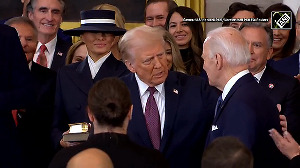We need not spend much time going over what this government has done and is doing to the Opposition, by misusing the Enforcement Directorate and the CBI. There is a daily update on that, notes Aakar Patel.

There was a popular video recently by a young man named Dhruv Rathee, which irked the government's supporters.
Its broad argument may be understood by the title, which was 'Is India becoming a dictatorship?' The examples used in the video included the recent rigging of the Chandigarh elections by the BJP, the recent rigging of the panel to select the chief election commissioner, the misuse of government agencies against Opposition leaders and so on.
The dictionary defines dictatorship as 'a form of government in which one person or a small group possesses absolute power without effective constitutional limitations' and 'a form of government in which absolute power is concentrated in an individual or a small clique'.
I will leave it to readers to see whether these definitions align with what is happening around us in India today.
The word 'dictator', like the word 'fascist', is overused, and its real meaning may be lost because it is seen as a term of abuse rather than one of definition.
When the social scientist Ashis Nandy described meeting our present prime minister before he became chief minister, he wrote the following:
'It was a long, rambling interview, but it left me in no doubt that here was a classic, clinical case of a fascist. I never use the term 'fascist' as a term of abuse; to me it is a diagnostic category comprising not only one's ideological posture but also the personality traits and motivational patterns contextualising the ideology.'
Nandy added: 'Modi, it gives me no pleasure to tell the readers, met virtually all the criteria that psychiatrists, psycho-analysts and psychologists had set up after years of empirical work on the authoritarian personality.
'He had the same mix of puritanical rigidity, narrowing of emotional life, massive use of the ego defence of projection, denial and fear of his own passions combined with fantasies of violence -- all set within the matrix of clear paranoid and obsessive personality traits.
'I still remember the cool, measured tone in which he elaborated a theory of cosmic conspiracy against India that painted every Muslim as a suspected traitor and a potential terrorist. I came out of the interview shaken...'

To my mind a less emotional and more reliable question is to ask whether we are under authoritarian rule.
This is defined as 'the lack of concern for the wishes or opinions of others'.
Now let us look at some indicators see if this is the case. What are they?
First, is there any concern for the wishes and opinions of those inside the government?
To answer that let us look at two important cases where we have conclusive evidence.
The first is the national lockdown of March 24, 2020.
The BBC filed 240 RTIs (right to information requests) one year after the lockdown to ask who in the Modi government knew that the lockdown was being announced that evening.
Was disaster management consulted? Or the finance ministry or health ministry? The answer from the government was: 'No.' Nobody had been consulted or informed.
The second is Demonetisation. On November 8, 2016, the Cabinet was summoned and ministers were told to not bring their mobile phones, meaning that they did not know till the PM told them on November 8 that Rs 1000 and Rs 500 notes would be useless after that evening.
Since the ministers did not know, the ministries did not know and did not prepare for either of these events.
Parliamentary forms of government function on something called collective responsibility. But not in New India.
In India, the head of State is instructed not to attend the inauguration of the new Parliament because the prime minister wants to preside and protocol requires that the head of State be absent.
Similarly and for the same reason the head of State is not asked to come to the inauguration of the temple which the prime minister wants to preside over.
This is not questioned, much less opposed, because the idea that only one individual represents the State has become accepted here.
Have a look at his photograph everywhere: one cannot escape it.
We need not spend much time going over what this government has done and is doing to the Opposition, by misusing the Enforcement Directorate and the Central Bureau of Investigation.
There is a daily update on that. It is nobody's case that there is any concern for the 'wishes and opinion' of the Constitutional Opposition.
Those in civil society who dissent also have seen that they must go directly to jail because there is no question of tolerating what they say.
Lastly, we must pay heed to what the external world is saying about India on this subject.
This month, the annual V-Dem Institute's report from the University of Gothenburg said: 'India's autocratization process has been well documented, including gradual but substantial deterioration of freedom of expression, compromising independence of the media, crackdowns on social media, harassment of journalists critical of the government, as well as attacks on civil society and intimidation of the opposition.'
Similar findings come from Freedom House, which ranks India as 'partially free'; Civicus, the global alliance of civil society organisations, which rates India as 'repressed' and the Economist Intelligence Unit which classified India as a 'flawed democracy'.
There are no indices anywhere in the world, including in nations we consider to be friends and allies, which suggest that Indians have become more free and India less authoritarian since 2014.
There is no objective defence. What the supporters of the prime minister, and I accept that there are many, can do instead is to tell us why it is that his divine authoritarianism is so good for us and our country.
Aakar Patel is a columnist and writer and you can read Aakar's earlier columns here.
Feature Presentation: Aslam Hunani/Rediff.com












 © 2025
© 2025